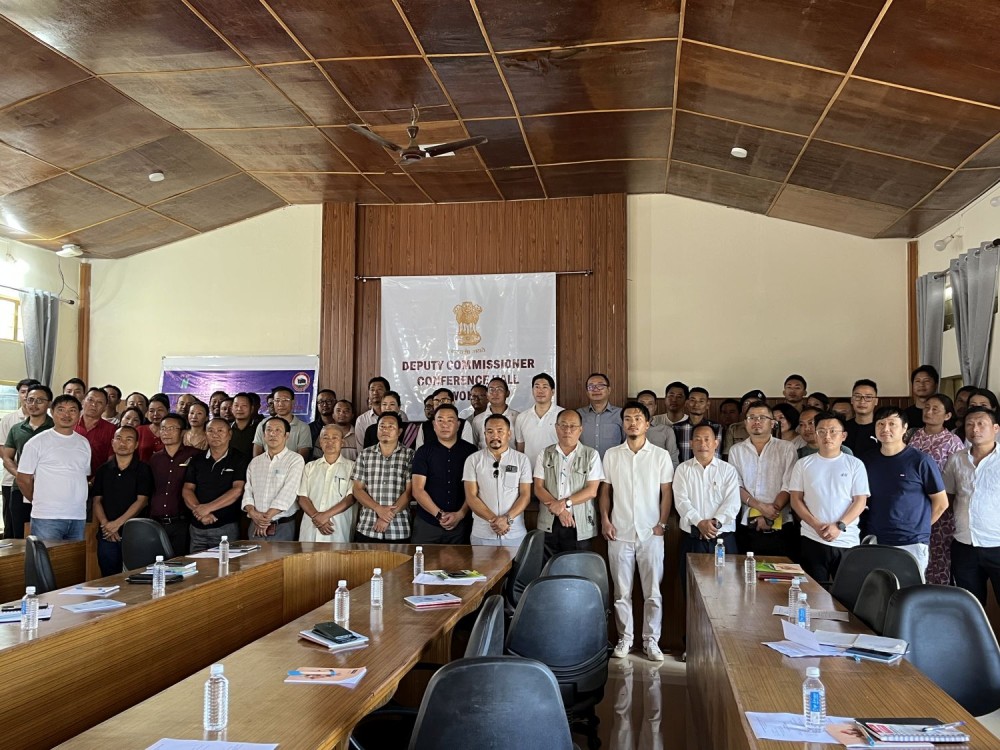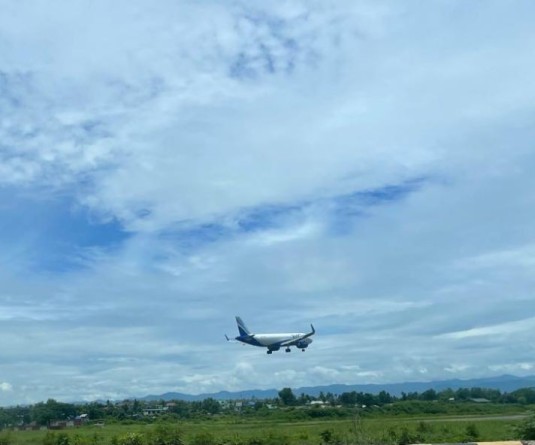Participants and officials with Deputy Commissioner Wokha, Vineet Kumar IAS, along with the officials from State Tax Department and various departmental officials and Stakeholders. (Morung Photo)

GST training for government department DDOs, dealers, taxpayers and stakeholders held
Morung Express News
Wokha | September 3
The Department of State Taxes, Nagaland organised “GST Training for Government Department DDOs, Dealers, Taxpayers and Stakeholders” at the Deputy Commissioner’s conference hall, Wokha, on September 3. The programme was held in two sessions, one for DDOs and another for taxpayers and stakeholders. Vineet Kumar, IAS, Deputy Commissioner of Wokha, graced the occasion as the special guest.
Deputy Commissioner of Wokha, Vineet Kumar, IAS, emphasised that a “strong government” is in the interest of all sections of society and that tax collection plays a pivotal role in ensuring governance, welfare, and stability. He expressed appreciation for the department’s initiative to bring the training to Wokha.
“Tax collection is not something new. Every form of government be it a democracy or monarchy, has always collected taxes. In a democracy, we continue this practice because the government collects taxes for the welfare of the people,” he said.
He pointed out that adequate reserves and financial strength are necessary for a government to function effectively. “Any government which does not have sufficient balance or money is not a strong government. A strong government is in the interest of everyone the rich, the middle class, and the poor. It ensures there is no chaos in society, that those left behind are taken care of, and that law and order prevail so people can enjoy the freedoms of a democratic country,” he maintained.
The DC Wokha reminded participants that while tax contributions may appear small at the individual level, collectively they form the backbone of governance. “The small share of taxes that we all contribute is a sacrifice for the larger good, so that we can live peacefully in society,” he remarked.
Addressing the role of DDOs, he stressed that their responsibility extends beyond routine duties. “In Nagaland, we are not collecting taxes as effectively as we should. There are leakages, and DDOs play a crucial role in ensuring compliance. It is not just a moral obligation but a legal responsibility,” Kumar underscored.
Citing examples such as the environment, healthcare, and education, he also explained that tax benefits are not always visible at the individual level but manifest through social goods that only the government can provide. “One small village may take care of its environment, but it cannot address the challenges of an entire state or country. That is where the role of government, supported by public contributions through taxes, becomes indispensable,” he said.
He expressed hope that the training would enhance awareness and compliance among participants, thereby strengthening the State’s revenue system and contributing to broader developmental goals.
Assistant Commissioner of State Taxes (ACST), Kohima, M Yanrenthung Yanthan, stressed on the importance of strengthening tax compliance and optimising GST revenue in Nagaland through consistent awareness and training programmes.
Delivering the keynote address, Yanrenthung highlighted the importance of GST registration, timely return filing, and the issuance of Tax Clearance Certificates. He also explained how the introduction of the Goods and Services Tax has transformed the taxation framework in the State.
Speaking to media persons on the sidelines, Yanrenthung shared that the Department of State Taxes has rolled out awareness and training programmes across six districts including Tuensang, Phek, Mokokchung, Wokha, Mon, and Kohima. “In June this year, GST revenue growth was recorded at around 101%. While this is encouraging, we still see leakages in various stages of GST collection. Through such trainings, we want to optimise tax collection and strengthen revenue generation,” he stated.
He explained that the initiative covers all stakeholders including DDOs, registered contractors, suppliers, business communities, and individual taxpayers. “Our objective is to ensure that the public gains more awareness of GST compliance, which will eventually benefit both taxpayers and the State’s revenue,” he added.
During the technical sessions, Yanrenthung, along with Program Officer (IT Branch) of the State Tax Department, Sanen Longchar, conducted live demonstrations on Tax Deducted at Source (TDS) registration, return filing procedures, and obtaining Tax Compliance Certificates.
Assistant Commissioner of State Taxes, Wokha, M Chibeni Lotha, delivered the welcome address, noting that such initiatives form part of the department’s broader efforts to engage stakeholders in line with the national vision of Viksit Bharat 2047.
In the second session, Commercial State Tax Officer, Wokha, Ongshau Phom, spoke on GST registration and return filing, while M Chibeni Lotha presented on Input Tax Credit. Yanrenthung further elaborated on payment, refund mechanisms, and tax-related offences.
The programme concluded with an interactive session, where participants from various government departments, trade bodies, and the business community sought clarifications on GST implementation and compliance issues.





